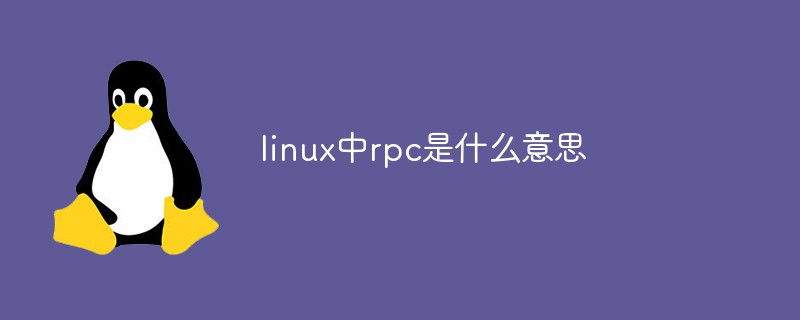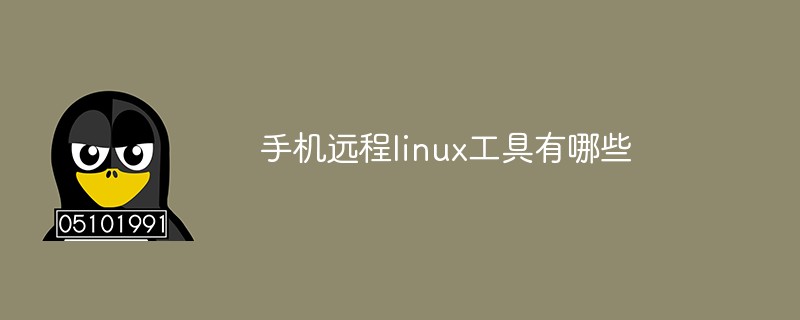 Operation and Maintenance
Operation and Maintenance Linux Operation and Maintenance
Linux Operation and Maintenance Is linux a multi-tasking and multi-user operating system?
Is linux a multi-tasking and multi-user operating system?yes. Linux is a free-to-use and freely disseminated Unix-like operating system. It is a multi-user, multi-task, multi-thread and multi-CPU operating system based on POSIX and UNIX. Linux inherits the network-centric design philosophy of Unix and is a multi-user network operating system with stable performance.

The operating environment of this tutorial: Ubuntu 18.04 system, Dell G3 computer.
Linux is a Unix-like operating system that is free to use and spread freely. It is a multi-user, multi-task, multi-thread and multi-CPU operating system based on POSIX and UNIX. It can run major UNIX software tools, applications and network protocols. It supports 32-bit and 64-bit hardware. Linux inherits the network-centric design philosophy of Unix and is a multi-user network operating system with stable performance.

Simply put, Linux is an open source operating system based on Unix.
Just like Windows or Mac OS.
On October 5, 1991, Linus Torvalds released the Linux kernel for the first time. The Linux kernel is a very important part of the Linux system. Currently, Linux is mainly used in a variety of servers and supercomputers. It is also used in mobile operating systems such as the Android operating system which is based on the Linux kernel.
In the early days, Linux was used as a free operating system for Intel ×86-based personal computers. Because Linux is an open source operating system, its source code can be modified or used, and can be released by anyone under a license such as the GPL (General Public License). In short, anyone can get their own operating system from Linux if they have some knowledge and know what they are doing. Because of this, there are many Linux distributions.
It is an operating system based on the Linux kernel. It comes with a collection of software that users can use. What's more, it also contains system management packages. There are many Linux distributions available today. Since we can’t count all the current Linux distributions, let’s take a look at some famous ones: Ubuntu, Fedora, Opensuse, Red hat Linux and Debian are a few very popular Linux distributions.

Ubuntu, a very popular Linux distribution and the third most popular operating system
Linux distribution is a distribution that is ready to be used on personal computers The complete package installed on your computer. Once a user installs a Linux distribution on a desktop or server, a variety of ready-made software and applications are available. Nowadays, many Linux distributions have great graphical user interfaces (GUI), which makes them a good alternative to Windows systems or Mac systems.
Currently, Linux distributions have greatly improved in terms of performance, interface, accessibility, and most importantly - user-friendliness. Some distributions, such as Ubuntu and Linux mint, have gained a good market position as the number of users increases day by day. Ubuntu is the third most popular operating system after Windows and Mac.
To summarize the above, Linux is a very powerful operating system (yes, it is very powerful). Day after day, it will gain more user influence and reputation. So, if you haven’t tried using any Linux system on your computer, then I recommend you to give it a try. We can guarantee that Linux will not let you down.
Related recommendations: "Linux Video Tutorial"
The above is the detailed content of Is linux a multi-tasking and multi-user operating system?. For more information, please follow other related articles on the PHP Chinese website!
 什么是linux设备节点Apr 18, 2022 pm 08:10 PM
什么是linux设备节点Apr 18, 2022 pm 08:10 PMlinux设备节点是应用程序和设备驱动程序沟通的一个桥梁;设备节点被创建在“/dev”,是连接内核与用户层的枢纽,相当于硬盘的inode一样的东西,记录了硬件设备的位置和信息。设备节点使用户可以与内核进行硬件的沟通,读写设备以及其他的操作。
 Linux中open和fopen的区别有哪些Apr 29, 2022 pm 06:57 PM
Linux中open和fopen的区别有哪些Apr 29, 2022 pm 06:57 PM区别:1、open是UNIX系统调用函数,而fopen是ANSIC标准中的C语言库函数;2、open的移植性没fopen好;3、fopen只能操纵普通正规文件,而open可以操作普通文件、网络套接字等;4、open无缓冲,fopen有缓冲。
 linux中什么叫端口映射May 09, 2022 pm 01:49 PM
linux中什么叫端口映射May 09, 2022 pm 01:49 PM端口映射又称端口转发,是指将外部主机的IP地址的端口映射到Intranet中的一台计算机,当用户访问外网IP的这个端口时,服务器自动将请求映射到对应局域网内部的机器上;可以通过使用动态或固定的公共网络IP路由ADSL宽带路由器来实现。
 linux中eof是什么May 07, 2022 pm 04:26 PM
linux中eof是什么May 07, 2022 pm 04:26 PM在linux中,eof是自定义终止符,是“END Of File”的缩写;因为是自定义的终止符,所以eof就不是固定的,可以随意的设置别名,linux中按“ctrl+d”就代表eof,eof一般会配合cat命令用于多行文本输出,指文件末尾。
 linux怎么判断pcre是否安装May 09, 2022 pm 04:14 PM
linux怎么判断pcre是否安装May 09, 2022 pm 04:14 PM在linux中,可以利用“rpm -qa pcre”命令判断pcre是否安装;rpm命令专门用于管理各项套件,使用该命令后,若结果中出现pcre的版本信息,则表示pcre已经安装,若没有出现版本信息,则表示没有安装pcre。
 linux怎么查询mac地址Apr 24, 2022 pm 08:01 PM
linux怎么查询mac地址Apr 24, 2022 pm 08:01 PMlinux查询mac地址的方法:1、打开系统,在桌面中点击鼠标右键,选择“打开终端”;2、在终端中,执行“ifconfig”命令,查看输出结果,在输出信息第四行中紧跟“ether”单词后的字符串就是mac地址。
 linux中rpc是什么意思May 07, 2022 pm 04:48 PM
linux中rpc是什么意思May 07, 2022 pm 04:48 PM在linux中,rpc是远程过程调用的意思,是Reomote Procedure Call的缩写,特指一种隐藏了过程调用时实际通信细节的IPC方法;linux中通过RPC可以充分利用非共享内存的多处理器环境,提高系统资源的利用率。
 手机远程linux工具有哪些Apr 29, 2022 pm 05:30 PM
手机远程linux工具有哪些Apr 29, 2022 pm 05:30 PM手机远程linux工具有:1、JuiceSSH,是一款功能强大的安卓SSH客户端应用,可直接对linux服务进行管理;2、Termius,可以利用手机来连接Linux服务器;3、Termux,一个强大的远程终端工具;4、向日葵远程控制等等。


Hot AI Tools

Undresser.AI Undress
AI-powered app for creating realistic nude photos

AI Clothes Remover
Online AI tool for removing clothes from photos.

Undress AI Tool
Undress images for free

Clothoff.io
AI clothes remover

AI Hentai Generator
Generate AI Hentai for free.

Hot Article

Hot Tools

PhpStorm Mac version
The latest (2018.2.1) professional PHP integrated development tool

DVWA
Damn Vulnerable Web App (DVWA) is a PHP/MySQL web application that is very vulnerable. Its main goals are to be an aid for security professionals to test their skills and tools in a legal environment, to help web developers better understand the process of securing web applications, and to help teachers/students teach/learn in a classroom environment Web application security. The goal of DVWA is to practice some of the most common web vulnerabilities through a simple and straightforward interface, with varying degrees of difficulty. Please note that this software

SecLists
SecLists is the ultimate security tester's companion. It is a collection of various types of lists that are frequently used during security assessments, all in one place. SecLists helps make security testing more efficient and productive by conveniently providing all the lists a security tester might need. List types include usernames, passwords, URLs, fuzzing payloads, sensitive data patterns, web shells, and more. The tester can simply pull this repository onto a new test machine and he will have access to every type of list he needs.

Safe Exam Browser
Safe Exam Browser is a secure browser environment for taking online exams securely. This software turns any computer into a secure workstation. It controls access to any utility and prevents students from using unauthorized resources.

MinGW - Minimalist GNU for Windows
This project is in the process of being migrated to osdn.net/projects/mingw, you can continue to follow us there. MinGW: A native Windows port of the GNU Compiler Collection (GCC), freely distributable import libraries and header files for building native Windows applications; includes extensions to the MSVC runtime to support C99 functionality. All MinGW software can run on 64-bit Windows platforms.





